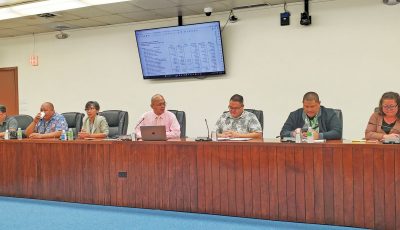Torres addresses JGO allegations about excessive utility billings
Gov. Ralph DLG. Torres said he has decided to end the House of Representatives Judiciary and Governmental Operations Committee’s “political show” by addressing JGO’s allegations regarding power and water billings from the Commonwealth Utilities Corp. associated with his private house in As Teo that is classified as the governor’s official residence.
“Our people deserve the truth,” said Torres in a sit-down interview with KKMP’s Gary Sword. The video of the interview was forwarded to the media yesterday and posted in the governor’s Facebook account.
The interview is the first in a series of videos where the governor said he will provide factual information directly from him in responses to the JGO’s allegations.
As of press time yesterday, Saipan Tribune was still awaiting comments from JGO chair Rep. Celina R. Babauta (D-Saipan).
Torres said he has decided to end this “political show” before the holidays so they can all get back to doing “real work for the people.”
He said he has publicly called for months for the JGO Committee to send him their concerns so he can reply with the truth. Torres sent a strongly-worded letter to Babauta last Nov. 8 with a one-week deadline requesting for questions in writing. Yet two weeks after the letter was sent, he has yet to receive any response from the JGO.
“I look forward to sharing more of my responses to these political and abusive allegations to the people directly in the coming weeks,” the governor said.
Citing the history of how the residence of the governor and lieutenant governor became a state residence, Torres said that in early 2000, the Department of Public Works condemned the governor’s official residence on Capital Hill.
Since then, he said, every governor and lieutenant governor would stay at their own homes and the government would pay for their utility—power and water.
On the issue of water usage, Torres said at one month he saw a billing that was extremely high so he was concerned about the billing and called CUC executive director Gary P. Camacho. He said he asked Camacho to look into the high water billing then asked him to make sure that they put a separate water meter, and treat him fairly in calculating that each meter is charged the right way, meaning there is a government rate and there is a residential rate.
“So since then, upon my request, they have separated the water meter from the main house and to the other meter,” said Torres, adding that the As Teo farm has its own water meter and his own house has its own water meter.
The governor emphasized that the government has not paid a penny on the private property that has a piggery because that comes out from the other account.
On the issue of him paying cash on occasion for his CUC bill—which the JGO had described as unusual—Torres said that CUC had given him an ultimatum that if he does not pay his billing of $6,000, they will disconnect him.
“So obviously I don’t have the money and so I asked my loved ones for help and so I got the money and went in and paid for it,” he said.
Torres said he got reimbursed after that because the government was supposed to take that account, but since they have not changed the account, he ended up paying for the billing itself.
As for the JGO’s insinuation that he got preferential treatment at CUC, Torres said it’s not true, as there’s a case when they called and told him if he does not pay $6,000 they will disconnect his power.
The governor noted that Camacho testified before the JGO Committee, stating that he (Torres) called him to the residence to make sure that the accountability and transparency on the water meter and utility meter is done right and is calculated and charged the right way.
“None of the account on the private account has been paid by the government,” he said.
As for CUC’s water billing in the total amount of $177,278, which the JGO called unusual and excessive, Torres said that was exactly the month when he called Camacho after he saw the unusual billing of $16,000-plus.
The governor said he knows it’s unusual to rack up that amount in one month so he called Camacho to fix the account and make sure to charge the private account as residential over a government account.
“So since then, it’s been up-to-date and has been addressed accordingly and we have no issues since then,” he said.
Torres also explained about a utility account registered to his sister, Julie Marie Torres, that was paid in the amount of $36,069 by the government for the power usage during the period of January 2015 and September. 2018.
Torres said that his sister, Julie Marie, used to live in that Koblerville house, so her name was on the billing. He said when he won as lieutenant governor and moved in, CUC said that he has two choices—either to disconnect or have it under his name and then charge him a reconnection fee, or just submit a letter from his sister authorizing him to use the Koblerville house under her name with authorization.
“So we have that on record—that she gave me the authorization to stay. So since then, I was staying in the house, not my sister. It was me and my kids and my family,” he said.
Torres said that’s why CUC was billing that residence to his sister because his sister gave him authorization to live there. “Her name was in the account prior to me moving in, which is the reason why her name was in the account,” said the governor.
Torres also explained about JGO’s showing of a sample of his CUC bill in the amount of $16,949, which covered March 2019 to April 2019, of which the total electric charge was $1,619 and the water charges were $15,309. The total number of kilowatt hours used at the Torres residence was 5,004 kilowatt hours and the total water consumed was 263,679 gallons in one month.
Torres said there’s no way he consumed that much water so it’s the same situation when he called CUC to make sure that the account is charged the right way.
“We addressed that issue. It’s the same issue that the government has not paid a penny more than the residential rate, the usage that we use here,” he said.



























